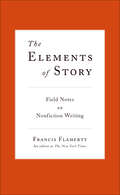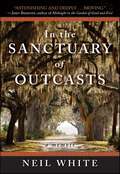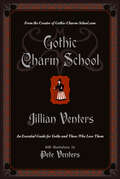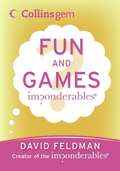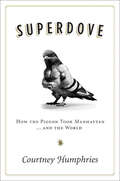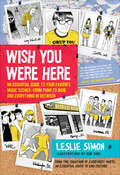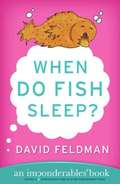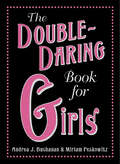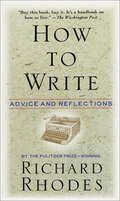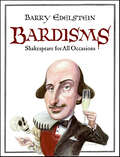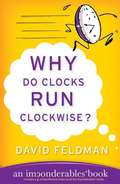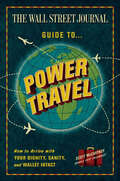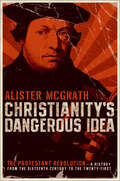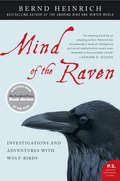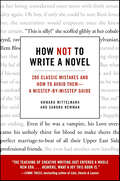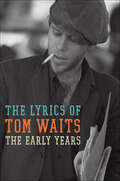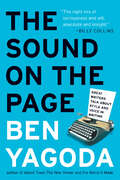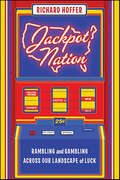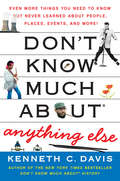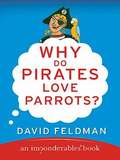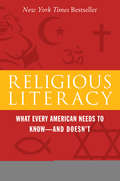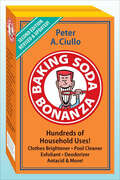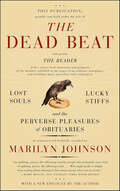- Table View
- List View
The Elements of Story: Field Notes on Nonfiction Writing
by Francis Flaherty“A splendid book for journalists (new or old), fiction writers, essayists, and critics. But it could also be of great use to the intelligent common reader, the man or woman who wonders why it’s impossible to finish reading certain stories and why others carry the reader in a vivid rush to the end.”—Pete Hamill, author of A Drinking LifeIn the spirit of Strunk and White’s classic The Elements of Style, comes The Elements of Story, by Francis Flaherty, longtime story editor at The New York Times. A brilliant blend of memoir and how-to, The Elements of Story offers more than 50 principles that emphasize storytelling aspects rather than simply the mechanics of writing—a relentlessly entertaining, totally accessible writing guide for the novice and the professional alike.
In the Sanctuary of Outcasts: A Memoir (P. S. Series)
by Neil White"A remarkable story of a young man's loss of everything he deemed important, and his ultimate discovery that redemption can be taught by society's most dreaded outcasts." —John Grisham "Hilarious, astonishing, and deeply moving." —John Berendt, author of Midnight in the Garden of Good and EvilThe emotional, incredible true story of Neil White, a man who discovers the secret to happiness, leading a fulfilling life, and the importance of fatherhood in the most unlikely of places—the last leper colony in the continental United States. In the words of Pulitzer Prize winner Robert Olen Butler (A Good Scent from a Strange Mountain), White is “a splendid writer,” and In the Sanctuary of Outcasts “a book that will endure.”
Gothic Charm School: An Essential Guide for Goths and Those Who Love Them
by Jillian VentersAn essential, fully illustrated guidebook to day-to-day Goth livingThere's more to being a Goth than throwing on some black velvet, dyeing your hair, and calling it a day (or a night). How do you dress with morbid flair when going to a job interview? Is there such a thing as growing too old to be a Goth? How do you explain to your grandma that it's not just a phase?Jillian Venters, a.k.a. "the Lady of the Manners," knows how to be strange and unusual without sacrificing politeness and etiquette. In Gothic Charm School, she offers the quintessential guide to dark decorum for all those who have ever searched for beauty in dark, unexpected places, embraced their individuality, and reveled in decadence . . . and for families and friends who just don't understand.
Imponderables(R): Fun and Games
by David FeldmanIn gathering the most fascinating questions asked about sports and entertainment into a handy Gem format, pop culture guru David Feldman demystifies these and much more in Imponderables®: Fun and Games. Providing you with information you can't find in encyclopedias, dictionaries, or almanacs, Fun and Games is a fun look at the little things that make life so interesting.
Superdove: How the Pigeon Took Manhattan ... And the World
by Courtney HumphriesWhy do we see pigeons as lowly urban pests and how did they become such common city dwellers? Courtney Humphries traces the natural history of the pigeon, recounting how these shy birds that once made their homes on the sparse cliffs of sea coasts came to dominate our urban public spaces. While detailing this evolution, Humphries introduces us to synanthropy: The concept that animals can become dependent on humans without ceasing to be wild; they can adapt to the cityscape as if it were a field or a forest.Superdove simultaneously explores the pigeon's cultural transformation, from its life in the dovecotes of ancient Egypt to its service in the trenches of World War I, to its feats within the pigeon-racing societies of today. While the dove is traditionally recognized as a symbol of peace, the pigeon has long inspired a different sort of fetishistic devotion from breeders, eaters, and artists—and from those who recognized and exploited the pigeon's astounding abilities. Because of their fecundity, pigeons were symbols of fertility associated with Aphrodite, while their keen ability to find their way home made them ideal messengers and even pilots. Their usefulness largely forgotten, today's pigeons have become as ubiquitous and reviled as rats. But Superdove reveals something more surprising: By using pigeons for our own purposes, we humans have changed their evolution. And in doing so, we have helped make pigeons the ideal city dwellers they are today. In the tradition of Rats, the book that made its namesake rodents famous, Superdove is the fascinating story of the pigeon's journey from the wild to the city—the home they'll never leave.
Wish You Were Here: An Essential Guide to Your Favorite Music Scenes—from Punk to Indie and Everything in Between
by Leslie Simon“This book was really fun to read and I actually learned a lot. Wait a minute... Does giving a quote for this book mean people will know that I didn’t actually already know this stuff? Lame.” — Hayley Williams, Paramore“Wish You Were Here knows way too much about the history, minute details, and inner-workings of these 11 punk and indie scenes. I don’t know how Leslie figured out all this stuff, but I’m changing my locks and checking the phone for bugs.” — Tim McIlrath, "Rise Against" guitarist and lead singer“Anything you ever wanted to know about your city’s indie scene (plus plenty of snark) is packed into these pages.” — Alternative Press“In what has got to be the best guide book on punk rock… well ever, rock journalist Simon answers a slew of questions never asked about punk rock and indie scenes across the U.S.”. — NeuFutur Magazine“Readers who are part of one of these scenes and fans of a particular genre who will be visiting one of the locales will find this a quick and useful read...an entertaining glimpse at nonmainstream music of today and the recent past.” — Library Journal“The selection of indie music–centric cities is spot-on… Simon’s text is knowledgeable… the book serves as a helpful jumping-off point for readers looking to learn more.” — Publishers Weekly“Simon ensures there’s never a dull moment...Rob Dobi’s spot-on illustrations appear throughout the book as the perfect complement to her enthusiastic and hilarious voice.” — Sacramento Book Review online
When Do Fish Sleep?
by David FeldmanPonder, if you will ... Why are tennis balls fuzzy? How come birds don't tip over when they sleep on telephone wires? What makes yawning contagious? Why, oh why, do roosters have to crow so early in the morning? Pop-culture guru David Feldman demystifies these topics and so much more in When Do Fish Sleep? -- the unchallenged source of answers to civilization's most baffling questions. Part of the Imponderables® series and charmingly illustrated by Kassie Schwan, When Do Fish Sleep? arms readers with the knowledge about everyday life that encyclopedias, dictionaries, and almanacs just don't have. And think about it, where else are you going to get to the bottom of why Mickey Mouse has only four fingers?
The Double-Daring Book for Girls
by Andrea J. Buchanan Miriam PeskowitzThe follow up to the bestselling phenomenon The Daring Book for Girls—an even more daring guide to everything from making a raft to learning how to play football to the art of the Japanese Tea Ceremony.In response to the resounding success of The Daring Book for Girls comes a second volume with all original material that promises to be full of even more daring adventure than the first. Girls will learn how to surf, horseback riding tips, April Fools Day history and pranks, how to make a labyrinth, how to sing, all about cowgirls, and how to organize a croquet tournament. Just as packed with creative and exciting material as the original, but double the fun, The Double-Daring Book for Girls is an adventure guidebook of stories, activities, facts, and games for daring girls everywhere.
How to Write: Advice and Reflections
by Richard RhodesUniquely fusing practical advice on writing with his own insights into the craft, Pulitzer Prize-winning author Richard Rhodes constructs beautiful prose about the issues would-be writers are most afraid to articulate: How do I dare write? Where do I begin? What do I do with this story I have to tell that fills and breaks my heart? Rich with personal vignettes about Rhode's sources of inspiration, How to Write is also a memoir of one of the most original and celebrated writers of our day.
Bardisms: Shakespeare for All Occasions
by Barry Edelstein“Browse the delightful Bardisms to find a fitting quote for any mood, moment, or occasion. But read it through to learn how to enjoy Shakespeare and bring more of his language into your daily life.” — Jacob Weisberg, Editor of Slate magazine and author of Bushisms“A fantastic reference for anyone who loves Shakespeare!” — Steve Martin From renowned Shakespearean director Barry Edelstein comes Bardisms: a straightforward, accessible guide to using Shakespeare’s wit and wisdom at special occasions of every type. Over the course of his career, Edelstein has directed more than half of Shakespeare’s plays, and he brings all his passion, insight, and years of study to Bardisms. In the words of Adam Gopnik (Through the Children's Gate), “Barry Edelstein knows more about Shakespeare, and in a less pedantic manner, than nearly anyone I know.”
Why Do Clocks Run Clockwise?
by David FeldmanPonder, if you will ... What is the difference between a kit and a caboodle? Why don't people get goose bumps on their faces? Where do houseflies go in the winter? What causes that ringing sound in your ears? Pop-culture guru David Feldman demystifies these topics and so much more in Why Do Clocks Run Clockwise? -- the unchallenged source of answers to civilization's most nagging questions. Part of the Imponderables® series and charmingly illustrated by Kassie Schwan, Why Do Clocks Run Clockwise? challenges readers with the knowledge about everyday life that encyclopedias, dictionaries, and almanacs just don't have. And think about it, where else are you going to get to the bottom of why hot dogs come ten to a package while hot dog buns come in eights?
The Wall Street Journal Guide to Power Travel: How to Arrive with Your Dignity, Sanity, and Wallet Intact
by Scott McCartneyImagine a world without late planes, missed connections, lost luggage, bumped passengers, cramped seating, high fees and higher fares, surly employees, and security lines. . . .Ordinary travel is an extraordinary ordeal. Yet despite the high prices and huge hassles, travel is essential—along with the need for tips, tricks, and techniques to improve the journey. The Wall Street Journal Guide to Power Travel is an entertaining road trip and a helpful guide, drawn from Scott McCartney's popular Middle Seat column, which explains why bad things happen to good travelers and what you can do to improve your lot. Expert advice and tips include:How to get cheap fares, first-class upgrades, and better seats.How to minimize chances of lost luggage and what to do when baggage doesn't show up.How to avoid delays, get around TSA bottlenecks, and minimize the chances you'll get stuck at some distant airport—and what to do if you do get stuck.How to complain to an airline and get some attention, right down to what to ask for in compensation and how to get the government's attention.
Christianity's Dangerous Idea: The Protestant Revolution—A History from the Sixteenth Century to the Twenty-First
by Alister McGrathA New Interpretation of Protestantism and Its Impact on the WorldThe radical idea that individuals could interpret the Bible for themselves spawned a revolution that is still being played out on the world stage today. This innovation lies at the heart of Protestantism's remarkable instability and adaptability. World-renowned scholar Alister McGrath sheds new light on the fascinating figures and movements that continue to inspire debate and division across the full spectrum of Protestant churches and communities worldwide.
Mind of the Raven: Investigations and Adventures with Wolf-Birds (P. S. Series)
by Bernd HeinrichHeinrich involves us in his quest to get inside the mind of the raven. But as animals can only be spied on by getting quite close, Heinrich adopts ravens, thereby becoming a "raven father," as well as observing them in their natural habitat. He studies their daily routines, and in the process, paints a vivid picture of the ravens' world. At the heart of this book are Heinrich's love and respect for these complex and engaging creatures, and through his keen observation and analysis, we become their intimates too.Heinrich's passion for ravens has led him around the world in his research. Mind of the Raven follows an exotic journey--from New England to Germany, and from Montana to Baffin Island in the high Arctic--offering dazzling accounts of how science works in the field, filtered through the eyes of a passionate observer of nature. Each new discovery and insight into raven behavior is thrilling to read, at once lyrical and scientific.
How Not to Write a Novel: 200 Classic Mistakes and How to Avoid Them—A Misstep-by-Misstep Guide
by Howard Mittelmark Sandra Newman"What do you think of my fiction book writing?" the aspiring novelist extorted. "Darn," the editor hectored, in turn. "I can not publish your novel! It is full of what we in the business call 'really awful writing.'" "But how shall I absolve this dilemma? I have already read every tome available on how to write well and get published!" The writer tossed his head about, wildly."It might help," opined the blonde editor, helpfully, "to ponder how NOT to write a novel, so you might avoid the very thing!"Many writing books offer sound advice on how to write well. This is not one of those books. On the contrary, this is a collection of terrible, awkward, and laughably unreadable excerpts that will teach you what to avoid—at all costs—if you ever want your novel published. In How Not to Write a Novel, authors Howard Mittelmark and Sandra Newman distill their 30 years combined experience in teaching, editing, writing, and reviewing fiction to bring you real advice from the other side of the query letter. Rather than telling you how or what to write, they identify the 200 most common mistakes unconsciously made by writers and teach you to recognize, avoid, and amend them. With hilarious "mis-examples" to demonstrate each manuscript-mangling error, they'll help you troubleshoot your beginnings and endings, bad guys, love interests, style, jokes, perspective, voice, and more. As funny as it is useful, this essential how-NOT-to guide will help you get your manuscript out of the slush pile and into the bookstore.
The Lyrics of Tom Waits: The Early Years
by Tom WaitsKnown for his growling vocals and for the distinct poetry of his lyrics, Tom Waits has amassed over the course of three decades a devoted cult following. The Early Years collects the lyrics—formative and classic—from the first ten albums of this true bard of hard living. A celebration of both his words and of the artist himself, this lyrical biography charts the course from Wait's emotional debut album, Closing Time (1977), to the experimental stirrings in Heartattack and Vine (1991) and One from the Heart (1992). Here the words achieve a new potency, adding further dimension to this singularly gifted artist.
The Sound on the Page: Great Writers Talk about Style and Voice in Writing
by Ben YagodaIn writing, style matters. Our favorite writers often entertain, move, and inspire us less by what they say than by how they say it. In The Sound on the Page, acclaimed author, teacher, and critic Ben Yagoda offers practical and incisive help for writers on developing and discovering their own style and voice. This wonderfully rich and readable book features interviews with more than 40 of our most important authors discussing their literary style, including:Dave BarryHarold BloomSupreme Court Justice Stephen BreyerBill BrysonMichael ChabonAndrei CodrescuJunot DíazAdam GopnikJamaica KincaidMichael KinsleyElmore LeonardElizabeth McCracken Susan OrleanCynthia OzickAnna QuindlenJonathan RabanDavid ThomsonTobias Wolff
Jackpot Nation: Rambling and Gambling Across Our Landscape of Luck
by Richard HofferIs this a great country or what?You can bet on the turn of the card or a roll of the dice, but also on the NFL, the NCAA, and which Olsen twin marries first. We bet $80 billion a year, the amount growing wildly as more and more people gain access to this huge American wheel of fortune. No longer quarantined in Las Vegas, gambling has become as local and convenient as our neighborhood cineplex. If there's not a casino around the corner, there's one on your laptop computer.In Jackpot Nation, Richard Hoffer takes us on a headlong tour, alternately horrifying and hilarious, across our landscape of luck. Whether he's trying to win a side of bacon in a Minnesota bar, hustling a paper sack filled with $100,000 in cash across Las Vegas parking lots, poring over expansion plans with a tribal chief in California, or visiting the New York prison cell of a retired bus salesman with a poor understanding of three-game parlays, Hoffer explores with wit and heart our national inclination—a cultural predisposition, even—to take a chance.
Don't Know Much About Anything Else
by Kenneth C. DavisFor years, Kenneth C. Davis has enlightened and enthralled us, opening our minds and tickling our fancies with his wonderfully irreverent, fun, and factual Don't Know Much About® books. He has carried readers on wild and edifying rides through history, mythology, geography, the Bible, the Civil War, even across the universe. Now, following on the heels of his triumphant New York Times bestseller Don't Know Much About® Anything, comes Don't Know Much About® Anything Else, his latest one-stop potpourri of intriguing information. Chock-full of delightful historical snippets and fascinating people, remarkable milestones and boneheaded blunders, and eye-opening, brain-boggling facts about simply anything and everything in the world, here is the ideal companion for those long car rides, plane flights, quality family hours, or relaxing downtime.
Don't Know Much About Anything Else
by Kenneth C. DavisFor years, Kenneth C. Davis has enlightened and enthralled us, opening our minds and tickling our fancies with his wonderfully irreverent, fun, and factual Don't Know Much About® books. He has carried readers on wild and edifying rides through history, mythology, geography, the Bible, the Civil War, even across the universe. Now, following on the heels of his triumphant New York Times bestseller Don't Know Much About® Anything, comes Don't Know Much About® Anything Else, his latest one-stop potpourri of intriguing information. Chock-full of delightful historical snippets and fascinating people, remarkable milestones and boneheaded blunders, and eye-opening, brain-boggling facts about simply anything and everything in the world, here is the ideal companion for those long car rides, plane flights, quality family hours, or relaxing downtime.
Why Do Pirates Love Parrots?
by David FeldmanAre you the type of person who stays up nights wondering how they get the paper tag into Hershey's Kisses? Or why portholes are round? Even if you don't lose sleep over such matters, you have to admit that such questions are, well, worthy of consideration. Here, from David Feldman, creator of the Imponderables® series, are the latest questions on the minds of his devoted readers and fans. No question from his readers is too small or obscure for Feldman to tackle. From the return of red M&Ms (they are back, if you've missed it) to new-car smell, the answers to life's little mysteries are dissected in these pages. Although it's all done in great fun, there is also an educational edge to the answers, as Feldman ferrets out top experts in diverse fields to come up with his entertaining answers. And their answers may surprise you-from the detailed physics involved in why cans of Diet Coke float but regular Coke doesn't, all the way to why they put crinkly paper into pairs of men's socks (but only one sock, not both). Complete with drawings by longtime Imponderables® illustrator Kassie Schwan, and a special section updating answers to questions in previous books in the series, this eleventh book of Imponderables® is sure to entertain the thousands of Feldman fans who have purchased over 2 million copies to date. Prepare to be delighted!
Religious Literacy
by Stephen ProtheroThe United States is one of the most religious places on earth, but it is also a nation of shocking religious illiteracy. Only 10 percent of American teenagers can name all five major world religions and 15 percent cannot name any. Nearly two-thirds of Americans believe that the Bible holds the answers to all or most of life's basic questions, yet only half of American adults can name even one of the four gospels and most Americans cannot name the first book of the Bible. Despite this lack of basic knowledge, politicians and pundits continue to root public policy arguments in religious rhetoric whose meanings are missed-or misinterpreted-by the vast majority of Americans. "We have a major civic problem on our hands," says religion scholar Stephen Prothero. He makes the provocative case that to remedy this problem, we should return to teaching religion in the public schools. Alongside "reading, writing, and arithmetic," religion ought to become the "Fourth R" of American education. Many believe that America's descent into religious illiteracy was the doing of activist judges and secularists hell-bent on banishing religion from the public square. Prothero reveals that this is a profound misunderstanding. "In one of the great ironies of American religious history," Prothero writes, "it was the nation's most fervent people of faith who steered us down the road to religious illiteracy. Just how that happened is one of the stories this book has to tell." Prothero avoids the trap of religious relativism by addressing both the core tenets of the world's major religions and the real differences among them. Complete with a dictionary of the key beliefs, characters, and stories of Christianity, Islam, and other religions, Religious Literacy reveals what every American needs to know in order to confront the domestic and foreign challenges facing this country today.
Religious Literacy
by Stephen ProtheroThe United States is one of the most religious places on earth, but it is also a nation of shocking religious illiteracy.Only 10 percent of American teenagers can name all five major world religions and 15 percent cannot name any.Nearly two-thirds of Americans believe that the Bible holds the answers to all or most of life's basic questions, yet only half of American adults can name even one of the four gospels and most Americans cannot name the first book of the Bible.Despite this lack of basic knowledge, politicians and pundits continue to root public policy arguments in religious rhetoric whose meanings are missed--or misinterpreted--by the vast majority of Americans."We have a major civic problem on our hands," says religion scholar Stephen Prothero. He makes the provocative case that to remedy this problem, we should return to teaching religion in the public schools. Alongside "reading, writing, and arithmetic," religion ought to become the "Fourth R" of American education.Many believe that America's descent into religious illiteracy was the doing of activist judges and secularists hell-bent on banishing religion from the public square. Prothero reveals that this is a profound misunderstanding. "In one of the great ironies of American religious history," Prothero writes, "it was the nation's most fervent people of faith who steered us down the road to religious illiteracy. Just how that happened is one of the stories this book has to tell."Prothero avoids the trap of religious relativism by addressing both the core tenets of the world's major religions and the real differences among them. Complete with a dictionary of the key beliefs, characters, and stories of Christianity, Islam, and other religions, Religious Literacy reveals what every American needs to know in order to confront the domestic and foreign challenges facing this country today.
Baking Soda Bonanza
by Peter A. CiulloLearn how to soothe sunburns, dry-clean your dog, and perform other household miracles with baking sodaWant to relieve your stuffy nose? Make your musty old books smell better? Kill roaches without pesticide? You can do it all with baking soda, and this updated edition of Baking Soda Bonanza shows you how! Cheap, ecologically sound, and more effective than most household cleaners, baking soda can be used to fix all sorts of household problems, from baking the perfect muffins to soothing bee stings to clearing out clogged drains. With a history of baking soda and many popular recipes for baking included, this is a book every household should have.
The Dead Beat: Lost Souls, Lucky Stiffs, and the Perverse Pleasures of Obituaries
by Marilyn JohnsonA light-hearted look at the history and practice of “the ultimate human-interest story,” the obituary.“What a wonderful surprise—a charming, lyrical book about the men and women who write obituaries. The Dead Beat is sly, droll, and completely winning.”— David HalberstamWhere can readers celebrate the life of the pharmacist who moonlighted as a spy, the genius behind Sea Monkeys, the school lunch lady who spent her evenings as a ballroom hostess? The obituary page, of course. Enthralled by these fascinating former lives, Marilyn Johnson tumbled into the little known world of the obituary page to find out what made it so compelling. She sought out the best obits in the English language, and chased the people who spent their lives writing about the dead. Surveying Internet chat rooms, surviving a mass gathering of obituarists, and making the pilgrimage to London to savor the most caustic and literate obits of all, she leads us into the cult and culture behind this fascinating segment of our daily news.
